CHCLEG001: Navigating Legal and Ethical Duties in Early Childhood
VerifiedAdded on 2023/06/18
|27
|6153
|53
Homework Assignment
AI Summary
This assignment solution for CHCLEG001 focuses on the legal and ethical obligations within early childhood education and care services. It identifies the National Law setting standards for childcare, family day care, and preschools, along with ethical responsibilities outlined by Early Childhood Australia. The solution describes the purpose of the Education and Care Services National Regulations, including adult-child ratios and emergency procedure requirements. It explains the structure and purpose of the National Quality Standards, detailing how quality standards are used to assess service performance. Additionally, it lists Commonwealth and State/Territory laws applicable to early childhood services and outlines educator obligations under these laws. The assignment also discusses the importance of written service policies and lists essential policies a service must have in place to ensure quality education and care.
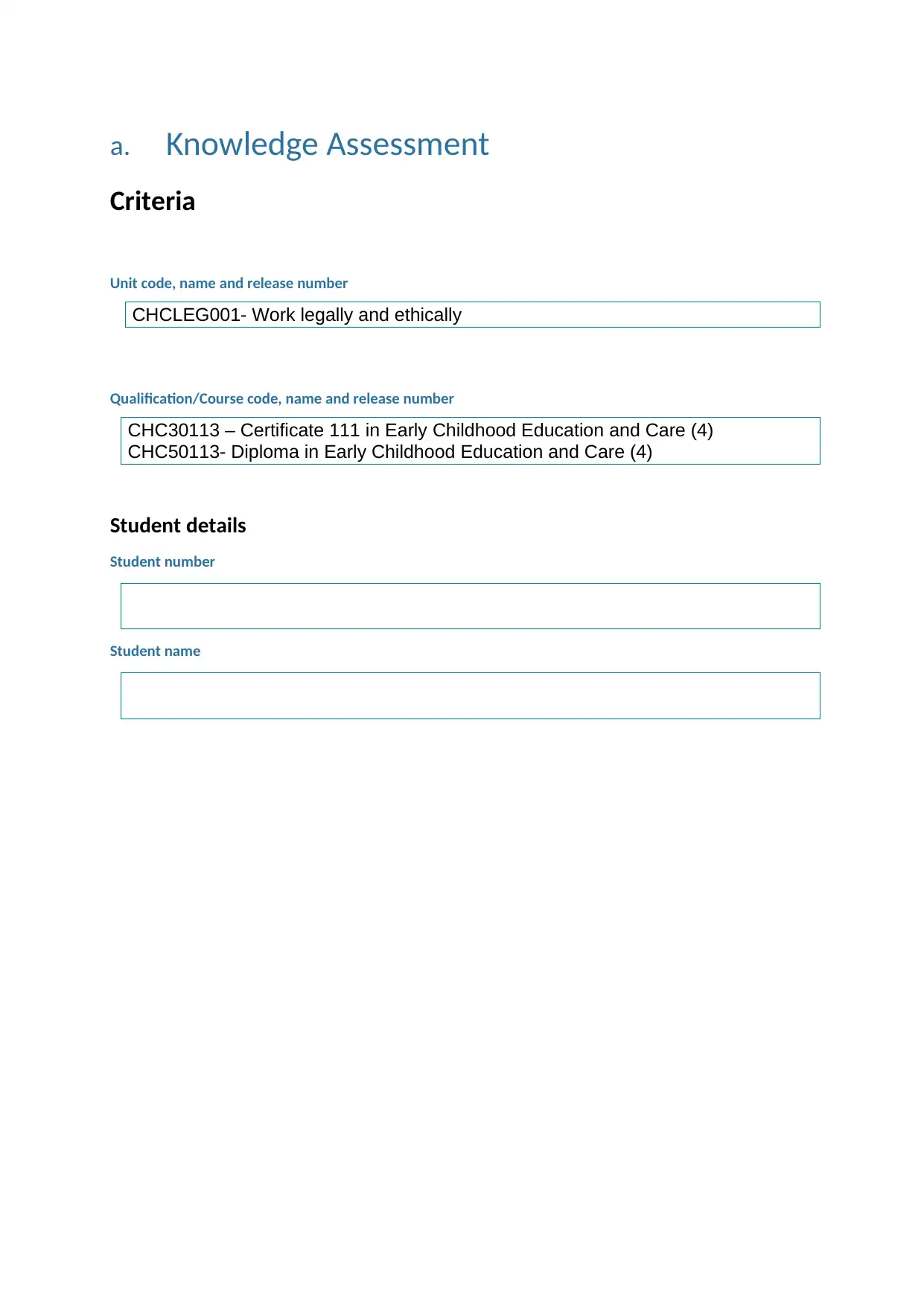
a. Knowledge Assessment
Criteria
Unit code, name and release number
CHCLEG001- Work legally and ethically
Qualification/Course code, name and release number
CHC30113 – Certificate 111 in Early Childhood Education and Care (4)
CHC50113- Diploma in Early Childhood Education and Care (4)
Student details
Student number
Student name
Criteria
Unit code, name and release number
CHCLEG001- Work legally and ethically
Qualification/Course code, name and release number
CHC30113 – Certificate 111 in Early Childhood Education and Care (4)
CHC50113- Diploma in Early Childhood Education and Care (4)
Student details
Student number
Student name
Paraphrase This Document
Need a fresh take? Get an instant paraphrase of this document with our AI Paraphraser

Version: 1.0
Health, Wellbeing and Community Services SkillsPoint
© 2011 Department of Education and Communities, TAFE NSW eLearning Hub | Version: 0.0 | Created: dd/mm/2011
Health, Wellbeing and Community Services SkillsPoint
© 2011 Department of Education and Communities, TAFE NSW eLearning Hub | Version: 0.0 | Created: dd/mm/2011
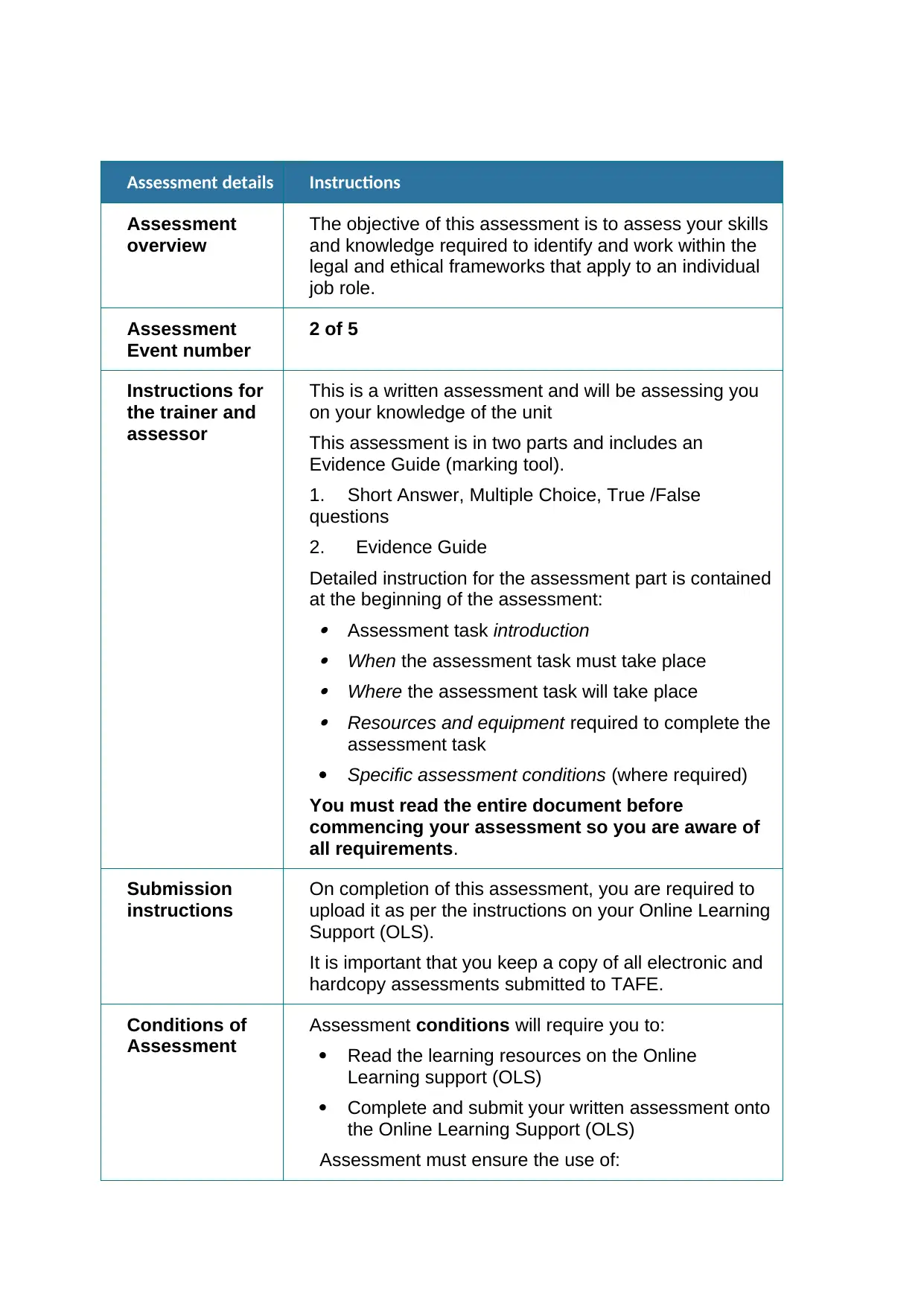
Table 1 Assessment instructions
Assessment details Instructions
Assessment
overview
The objective of this assessment is to assess your skills
and knowledge required to identify and work within the
legal and ethical frameworks that apply to an individual
job role.
Assessment
Event number
2 of 5
Instructions for
the trainer and
assessor
This is a written assessment and will be assessing you
on your knowledge of the unit
This assessment is in two parts and includes an
Evidence Guide (marking tool).
1. Short Answer, Multiple Choice, True /False
questions
2. Evidence Guide
Detailed instruction for the assessment part is contained
at the beginning of the assessment:
Assessment task introduction
When the assessment task must take place
Where the assessment task will take place
Resources and equipment required to complete the
assessment task
Specific assessment conditions (where required)
You must read the entire document before
commencing your assessment so you are aware of
all requirements.
Submission
instructions
On completion of this assessment, you are required to
upload it as per the instructions on your Online Learning
Support (OLS).
It is important that you keep a copy of all electronic and
hardcopy assessments submitted to TAFE.
Conditions of
Assessment
Assessment conditions will require you to:
Read the learning resources on the Online
Learning support (OLS)
Complete and submit your written assessment onto
the Online Learning Support (OLS)
Assessment must ensure the use of:
Assessment details Instructions
Assessment
overview
The objective of this assessment is to assess your skills
and knowledge required to identify and work within the
legal and ethical frameworks that apply to an individual
job role.
Assessment
Event number
2 of 5
Instructions for
the trainer and
assessor
This is a written assessment and will be assessing you
on your knowledge of the unit
This assessment is in two parts and includes an
Evidence Guide (marking tool).
1. Short Answer, Multiple Choice, True /False
questions
2. Evidence Guide
Detailed instruction for the assessment part is contained
at the beginning of the assessment:
Assessment task introduction
When the assessment task must take place
Where the assessment task will take place
Resources and equipment required to complete the
assessment task
Specific assessment conditions (where required)
You must read the entire document before
commencing your assessment so you are aware of
all requirements.
Submission
instructions
On completion of this assessment, you are required to
upload it as per the instructions on your Online Learning
Support (OLS).
It is important that you keep a copy of all electronic and
hardcopy assessments submitted to TAFE.
Conditions of
Assessment
Assessment conditions will require you to:
Read the learning resources on the Online
Learning support (OLS)
Complete and submit your written assessment onto
the Online Learning Support (OLS)
Assessment must ensure the use of:
⊘ This is a preview!⊘
Do you want full access?
Subscribe today to unlock all pages.

Trusted by 1+ million students worldwide
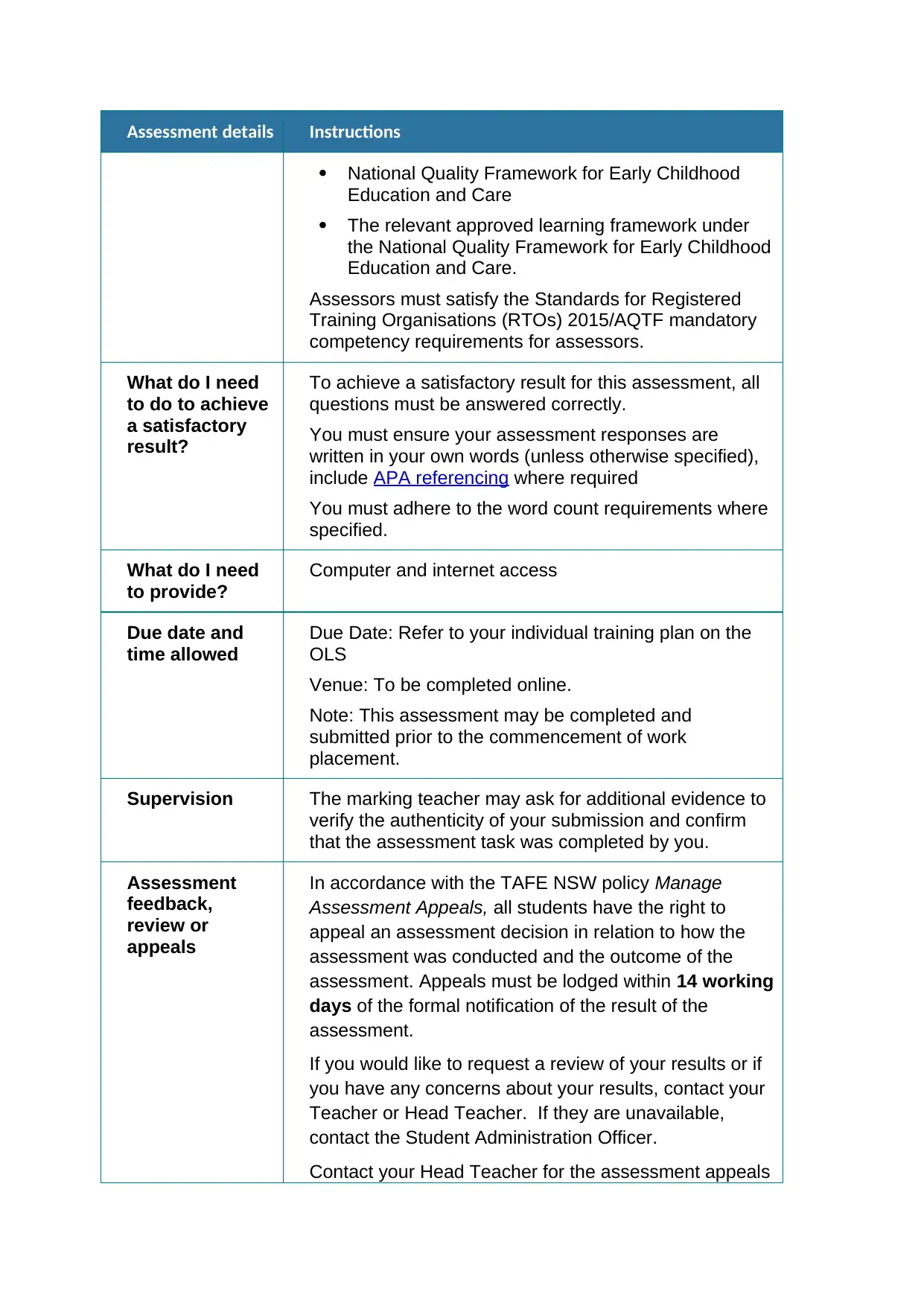
Assessment details Instructions
National Quality Framework for Early Childhood
Education and Care
The relevant approved learning framework under
the National Quality Framework for Early Childhood
Education and Care.
Assessors must satisfy the Standards for Registered
Training Organisations (RTOs) 2015/AQTF mandatory
competency requirements for assessors.
What do I need
to do to achieve
a satisfactory
result?
To achieve a satisfactory result for this assessment, all
questions must be answered correctly.
You must ensure your assessment responses are
written in your own words (unless otherwise specified),
include APA referencing where required
You must adhere to the word count requirements where
specified.
What do I need
to provide?
Computer and internet access
Due date and
time allowed
Due Date: Refer to your individual training plan on the
OLS
Venue: To be completed online.
Note: This assessment may be completed and
submitted prior to the commencement of work
placement.
Supervision The marking teacher may ask for additional evidence to
verify the authenticity of your submission and confirm
that the assessment task was completed by you.
Assessment
feedback,
review or
appeals
In accordance with the TAFE NSW policy Manage
Assessment Appeals, all students have the right to
appeal an assessment decision in relation to how the
assessment was conducted and the outcome of the
assessment. Appeals must be lodged within 14 working
days of the formal notification of the result of the
assessment.
If you would like to request a review of your results or if
you have any concerns about your results, contact your
Teacher or Head Teacher. If they are unavailable,
contact the Student Administration Officer.
Contact your Head Teacher for the assessment appeals
National Quality Framework for Early Childhood
Education and Care
The relevant approved learning framework under
the National Quality Framework for Early Childhood
Education and Care.
Assessors must satisfy the Standards for Registered
Training Organisations (RTOs) 2015/AQTF mandatory
competency requirements for assessors.
What do I need
to do to achieve
a satisfactory
result?
To achieve a satisfactory result for this assessment, all
questions must be answered correctly.
You must ensure your assessment responses are
written in your own words (unless otherwise specified),
include APA referencing where required
You must adhere to the word count requirements where
specified.
What do I need
to provide?
Computer and internet access
Due date and
time allowed
Due Date: Refer to your individual training plan on the
OLS
Venue: To be completed online.
Note: This assessment may be completed and
submitted prior to the commencement of work
placement.
Supervision The marking teacher may ask for additional evidence to
verify the authenticity of your submission and confirm
that the assessment task was completed by you.
Assessment
feedback,
review or
appeals
In accordance with the TAFE NSW policy Manage
Assessment Appeals, all students have the right to
appeal an assessment decision in relation to how the
assessment was conducted and the outcome of the
assessment. Appeals must be lodged within 14 working
days of the formal notification of the result of the
assessment.
If you would like to request a review of your results or if
you have any concerns about your results, contact your
Teacher or Head Teacher. If they are unavailable,
contact the Student Administration Officer.
Contact your Head Teacher for the assessment appeals
Paraphrase This Document
Need a fresh take? Get an instant paraphrase of this document with our AI Paraphraser

Assessment details Instructions
procedures at your college/campus.
procedures at your college/campus.
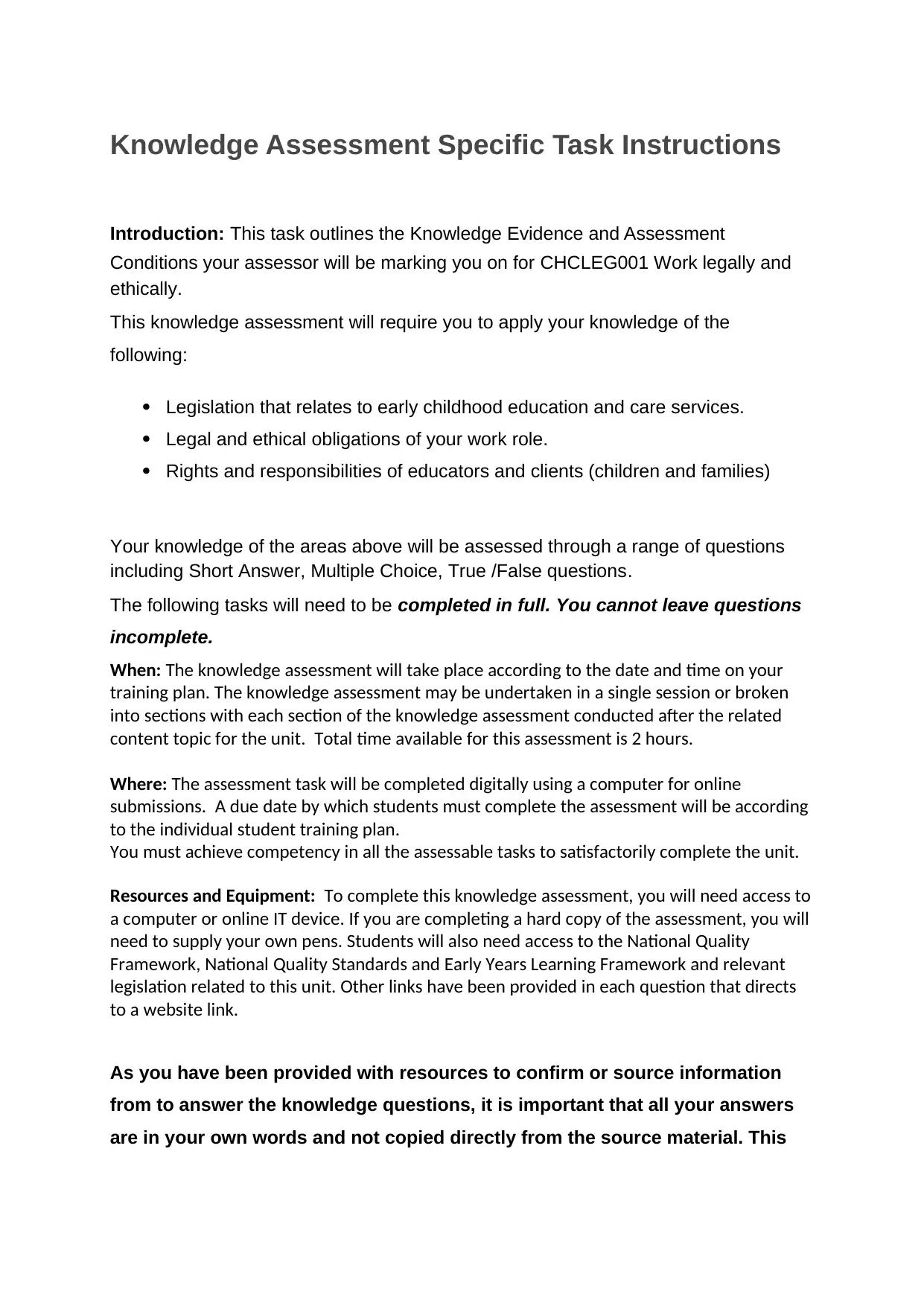
Knowledge Assessment Specific Task Instructions
Introduction: This task outlines the Knowledge Evidence and Assessment
Conditions your assessor will be marking you on for CHCLEG001 Work legally and
ethically.
This knowledge assessment will require you to apply your knowledge of the
following:
Legislation that relates to early childhood education and care services.
Legal and ethical obligations of your work role.
Rights and responsibilities of educators and clients (children and families)
Your knowledge of the areas above will be assessed through a range of questions
including Short Answer, Multiple Choice, True /False questions.
The following tasks will need to be completed in full. You cannot leave questions
incomplete.
When: The knowledge assessment will take place according to the date and time on your
training plan. The knowledge assessment may be undertaken in a single session or broken
into sections with each section of the knowledge assessment conducted after the related
content topic for the unit. Total time available for this assessment is 2 hours.
Where: The assessment task will be completed digitally using a computer for online
submissions. A due date by which students must complete the assessment will be according
to the individual student training plan.
You must achieve competency in all the assessable tasks to satisfactorily complete the unit.
Resources and Equipment: To complete this knowledge assessment, you will need access to
a computer or online IT device. If you are completing a hard copy of the assessment, you will
need to supply your own pens. Students will also need access to the National Quality
Framework, National Quality Standards and Early Years Learning Framework and relevant
legislation related to this unit. Other links have been provided in each question that directs
to a website link.
As you have been provided with resources to confirm or source information
from to answer the knowledge questions, it is important that all your answers
are in your own words and not copied directly from the source material. This
Introduction: This task outlines the Knowledge Evidence and Assessment
Conditions your assessor will be marking you on for CHCLEG001 Work legally and
ethically.
This knowledge assessment will require you to apply your knowledge of the
following:
Legislation that relates to early childhood education and care services.
Legal and ethical obligations of your work role.
Rights and responsibilities of educators and clients (children and families)
Your knowledge of the areas above will be assessed through a range of questions
including Short Answer, Multiple Choice, True /False questions.
The following tasks will need to be completed in full. You cannot leave questions
incomplete.
When: The knowledge assessment will take place according to the date and time on your
training plan. The knowledge assessment may be undertaken in a single session or broken
into sections with each section of the knowledge assessment conducted after the related
content topic for the unit. Total time available for this assessment is 2 hours.
Where: The assessment task will be completed digitally using a computer for online
submissions. A due date by which students must complete the assessment will be according
to the individual student training plan.
You must achieve competency in all the assessable tasks to satisfactorily complete the unit.
Resources and Equipment: To complete this knowledge assessment, you will need access to
a computer or online IT device. If you are completing a hard copy of the assessment, you will
need to supply your own pens. Students will also need access to the National Quality
Framework, National Quality Standards and Early Years Learning Framework and relevant
legislation related to this unit. Other links have been provided in each question that directs
to a website link.
As you have been provided with resources to confirm or source information
from to answer the knowledge questions, it is important that all your answers
are in your own words and not copied directly from the source material. This
⊘ This is a preview!⊘
Do you want full access?
Subscribe today to unlock all pages.

Trusted by 1+ million students worldwide
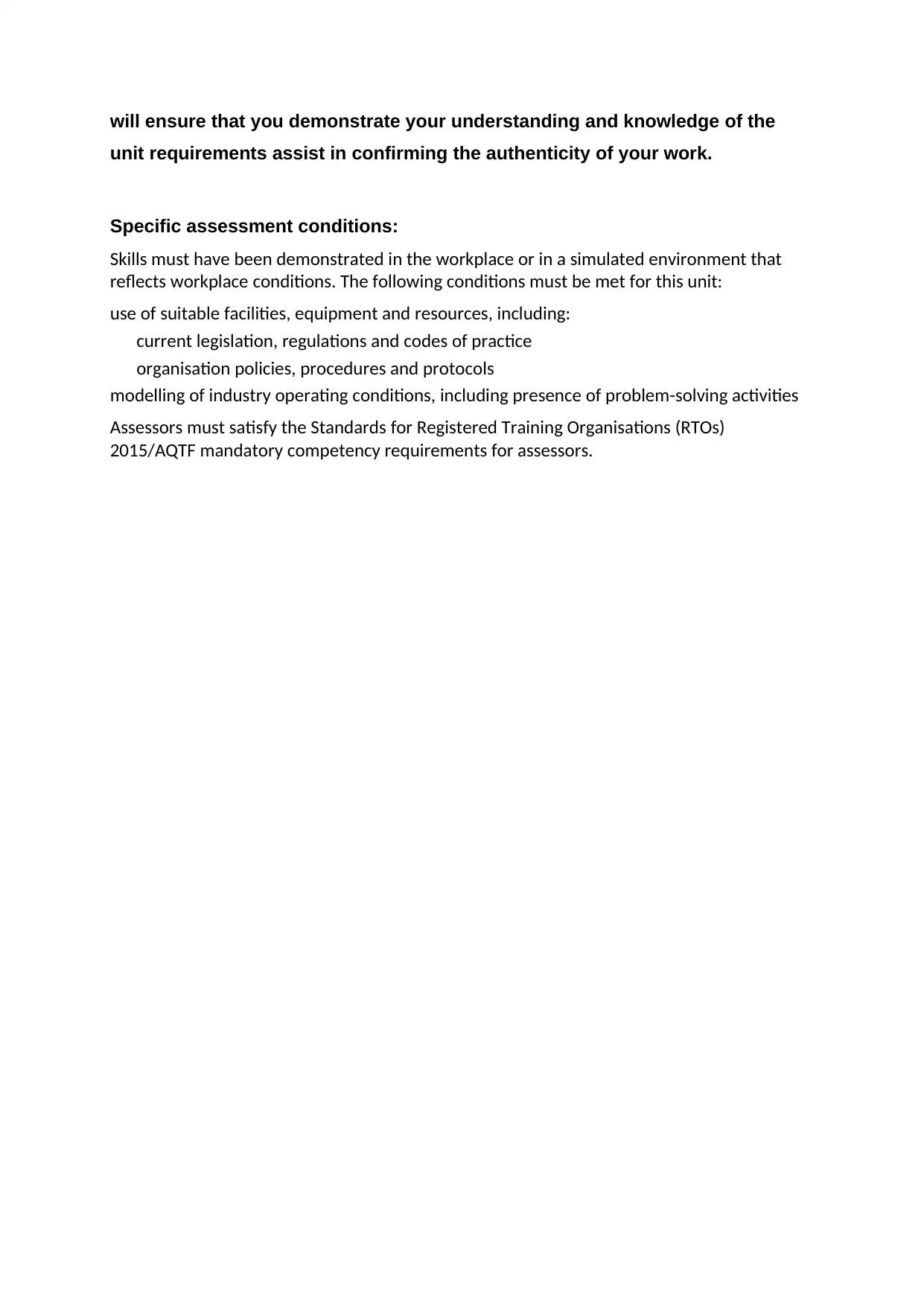
will ensure that you demonstrate your understanding and knowledge of the
unit requirements assist in confirming the authenticity of your work.
Specific assessment conditions:
Skills must have been demonstrated in the workplace or in a simulated environment that
reflects workplace conditions. The following conditions must be met for this unit:
use of suitable facilities, equipment and resources, including:
current legislation, regulations and codes of practice
organisation policies, procedures and protocols
modelling of industry operating conditions, including presence of problem-solving activities
Assessors must satisfy the Standards for Registered Training Organisations (RTOs)
2015/AQTF mandatory competency requirements for assessors.
unit requirements assist in confirming the authenticity of your work.
Specific assessment conditions:
Skills must have been demonstrated in the workplace or in a simulated environment that
reflects workplace conditions. The following conditions must be met for this unit:
use of suitable facilities, equipment and resources, including:
current legislation, regulations and codes of practice
organisation policies, procedures and protocols
modelling of industry operating conditions, including presence of problem-solving activities
Assessors must satisfy the Standards for Registered Training Organisations (RTOs)
2015/AQTF mandatory competency requirements for assessors.
Paraphrase This Document
Need a fresh take? Get an instant paraphrase of this document with our AI Paraphraser
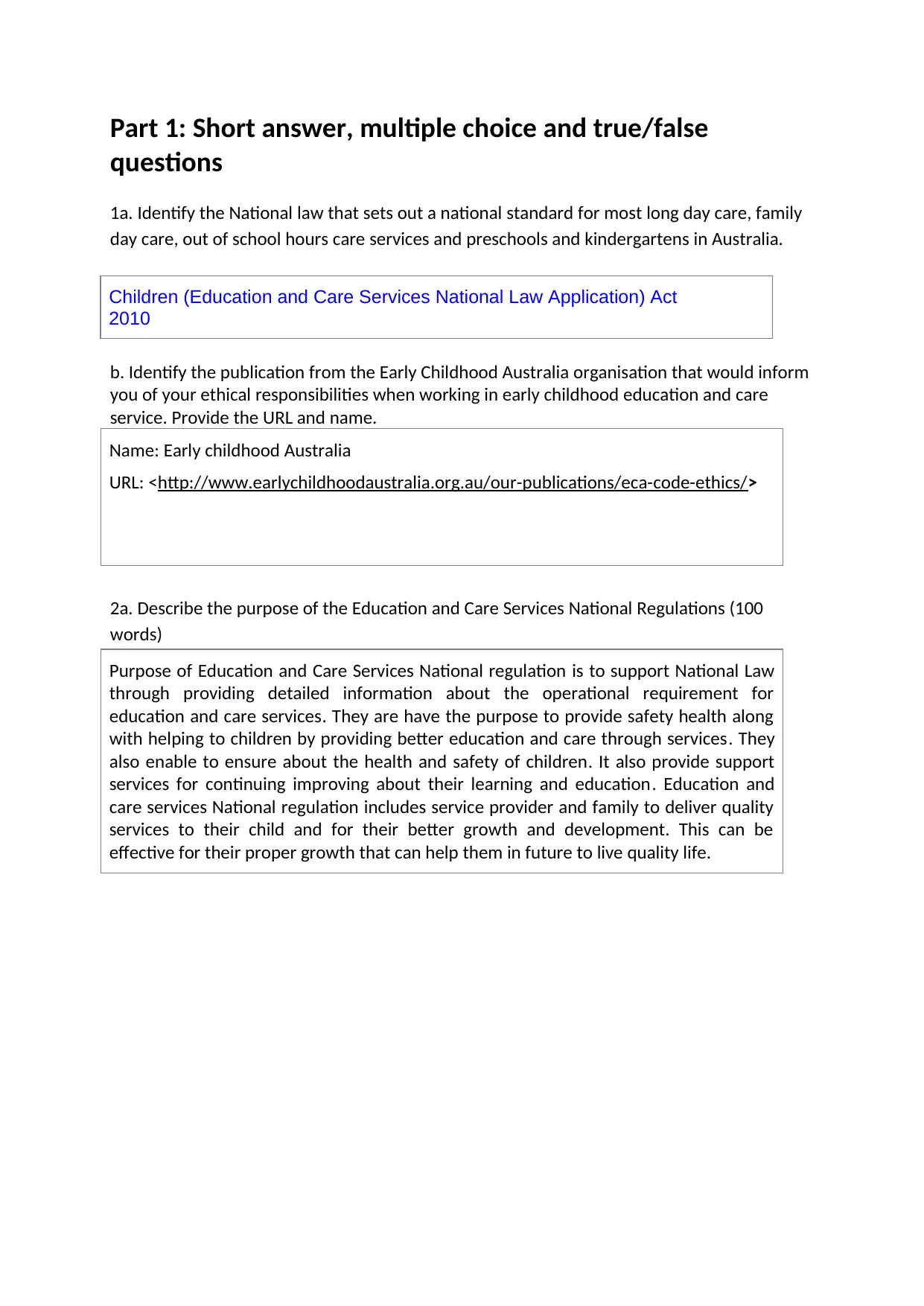
Part 1: Short answer, multiple choice and true/false
questions
1a. Identify the National law that sets out a national standard for most long day care, family
day care, out of school hours care services and preschools and kindergartens in Australia.
Children (Education and Care Services National Law Application) Act
2010
b. Identify the publication from the Early Childhood Australia organisation that would inform
you of your ethical responsibilities when working in early childhood education and care
service. Provide the URL and name.
Name: Early childhood Australia
URL: <http://www.earlychildhoodaustralia.org.au/our-publications/eca-code-ethics/>
2a. Describe the purpose of the Education and Care Services National Regulations (100
words)
Purpose of Education and Care Services National regulation is to support National Law
through providing detailed information about the operational requirement for
education and care services. They are have the purpose to provide safety health along
with helping to children by providing better education and care through services. They
also enable to ensure about the health and safety of children. It also provide support
services for continuing improving about their learning and education. Education and
care services National regulation includes service provider and family to deliver quality
services to their child and for their better growth and development. This can be
effective for their proper growth that can help them in future to live quality life.
questions
1a. Identify the National law that sets out a national standard for most long day care, family
day care, out of school hours care services and preschools and kindergartens in Australia.
Children (Education and Care Services National Law Application) Act
2010
b. Identify the publication from the Early Childhood Australia organisation that would inform
you of your ethical responsibilities when working in early childhood education and care
service. Provide the URL and name.
Name: Early childhood Australia
URL: <http://www.earlychildhoodaustralia.org.au/our-publications/eca-code-ethics/>
2a. Describe the purpose of the Education and Care Services National Regulations (100
words)
Purpose of Education and Care Services National regulation is to support National Law
through providing detailed information about the operational requirement for
education and care services. They are have the purpose to provide safety health along
with helping to children by providing better education and care through services. They
also enable to ensure about the health and safety of children. It also provide support
services for continuing improving about their learning and education. Education and
care services National regulation includes service provider and family to deliver quality
services to their child and for their better growth and development. This can be
effective for their proper growth that can help them in future to live quality life.
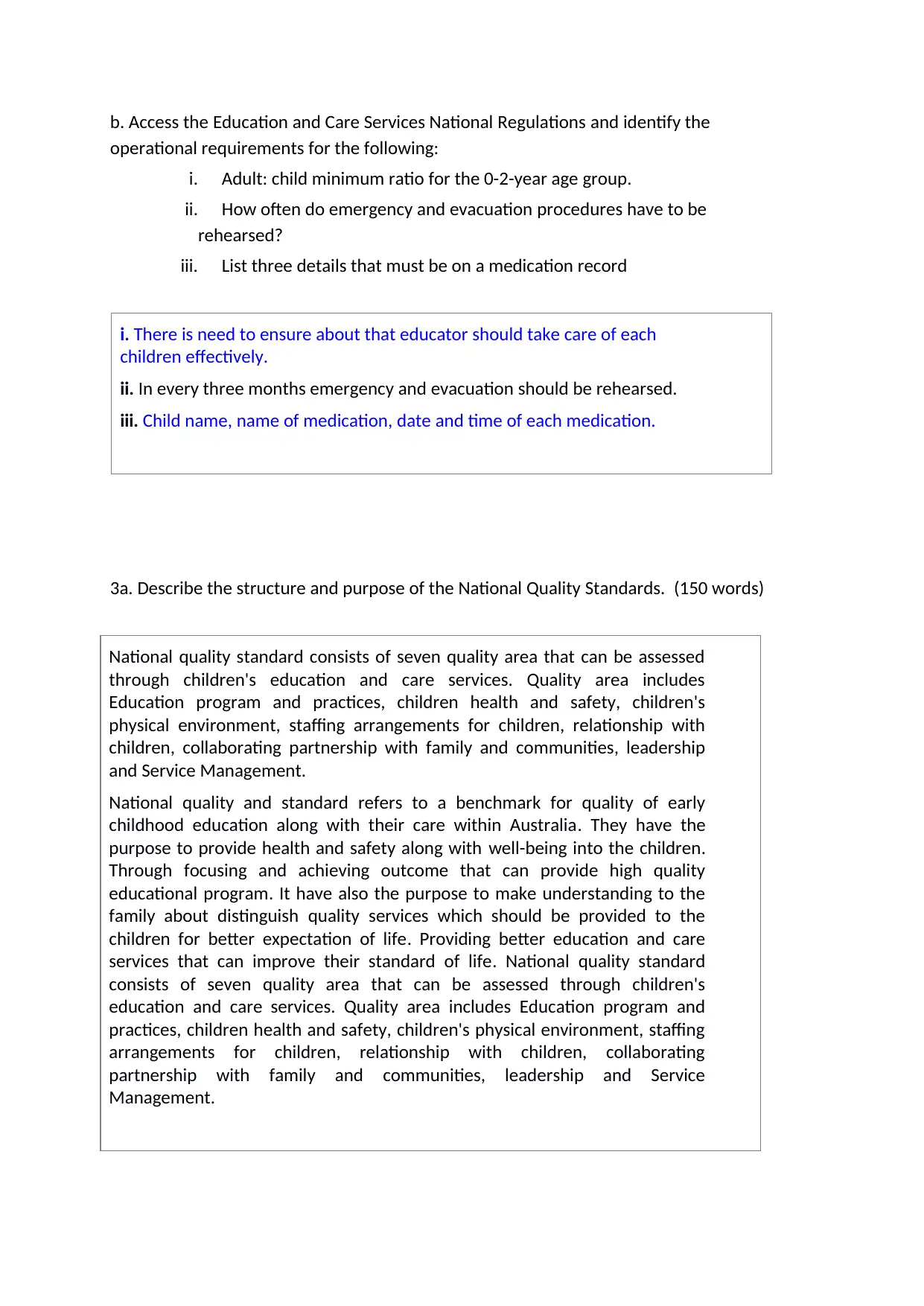
b. Access the Education and Care Services National Regulations and identify the
operational requirements for the following:
i. Adult: child minimum ratio for the 0-2-year age group.
ii. How often do emergency and evacuation procedures have to be
rehearsed?
iii. List three details that must be on a medication record
i. There is need to ensure about that educator should take care of each
children effectively.
ii. In every three months emergency and evacuation should be rehearsed.
iii. Child name, name of medication, date and time of each medication.
3a. Describe the structure and purpose of the National Quality Standards. (150 words)
National quality standard consists of seven quality area that can be assessed
through children's education and care services. Quality area includes
Education program and practices, children health and safety, children's
physical environment, staffing arrangements for children, relationship with
children, collaborating partnership with family and communities, leadership
and Service Management.
National quality and standard refers to a benchmark for quality of early
childhood education along with their care within Australia. They have the
purpose to provide health and safety along with well-being into the children.
Through focusing and achieving outcome that can provide high quality
educational program. It have also the purpose to make understanding to the
family about distinguish quality services which should be provided to the
children for better expectation of life. Providing better education and care
services that can improve their standard of life. National quality standard
consists of seven quality area that can be assessed through children's
education and care services. Quality area includes Education program and
practices, children health and safety, children's physical environment, staffing
arrangements for children, relationship with children, collaborating
partnership with family and communities, leadership and Service
Management.
operational requirements for the following:
i. Adult: child minimum ratio for the 0-2-year age group.
ii. How often do emergency and evacuation procedures have to be
rehearsed?
iii. List three details that must be on a medication record
i. There is need to ensure about that educator should take care of each
children effectively.
ii. In every three months emergency and evacuation should be rehearsed.
iii. Child name, name of medication, date and time of each medication.
3a. Describe the structure and purpose of the National Quality Standards. (150 words)
National quality standard consists of seven quality area that can be assessed
through children's education and care services. Quality area includes
Education program and practices, children health and safety, children's
physical environment, staffing arrangements for children, relationship with
children, collaborating partnership with family and communities, leadership
and Service Management.
National quality and standard refers to a benchmark for quality of early
childhood education along with their care within Australia. They have the
purpose to provide health and safety along with well-being into the children.
Through focusing and achieving outcome that can provide high quality
educational program. It have also the purpose to make understanding to the
family about distinguish quality services which should be provided to the
children for better expectation of life. Providing better education and care
services that can improve their standard of life. National quality standard
consists of seven quality area that can be assessed through children's
education and care services. Quality area includes Education program and
practices, children health and safety, children's physical environment, staffing
arrangements for children, relationship with children, collaborating
partnership with family and communities, leadership and Service
Management.
⊘ This is a preview!⊘
Do you want full access?
Subscribe today to unlock all pages.

Trusted by 1+ million students worldwide
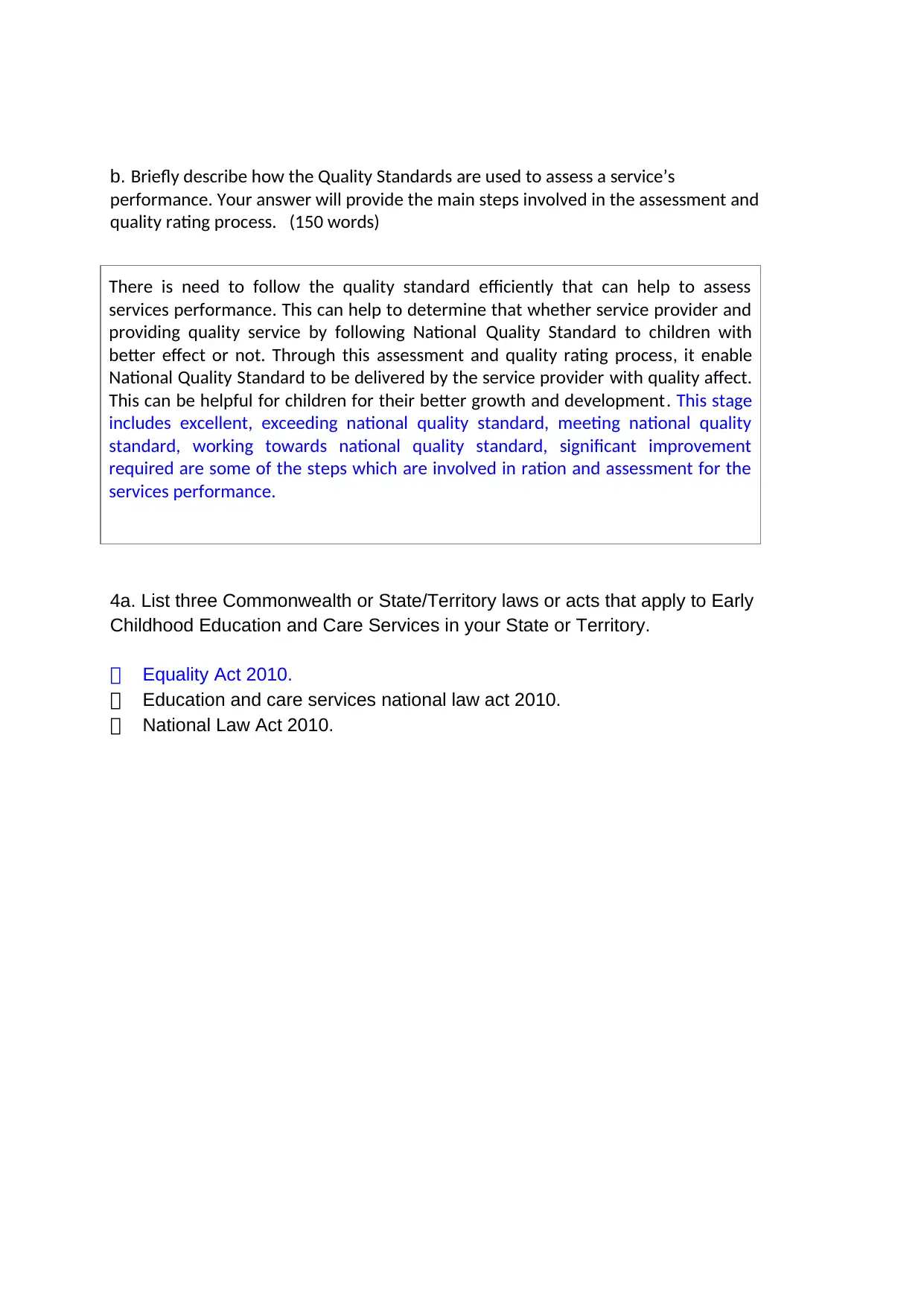
b. Briefly describe how the Quality Standards are used to assess a service’s
performance. Your answer will provide the main steps involved in the assessment and
quality rating process. (150 words)
There is need to follow the quality standard efficiently that can help to assess
services performance. This can help to determine that whether service provider and
providing quality service by following National Quality Standard to children with
better effect or not. Through this assessment and quality rating process, it enable
National Quality Standard to be delivered by the service provider with quality affect.
This can be helpful for children for their better growth and development. This stage
includes excellent, exceeding national quality standard, meeting national quality
standard, working towards national quality standard, significant improvement
required are some of the steps which are involved in ration and assessment for the
services performance.
4a. List three Commonwealth or State/Territory laws or acts that apply to Early
Childhood Education and Care Services in your State or Territory.
Equality Act 2010.
Education and care services national law act 2010.
National Law Act 2010.
b. Describe one educator obligation set out by each of the laws/acts you identified.
performance. Your answer will provide the main steps involved in the assessment and
quality rating process. (150 words)
There is need to follow the quality standard efficiently that can help to assess
services performance. This can help to determine that whether service provider and
providing quality service by following National Quality Standard to children with
better effect or not. Through this assessment and quality rating process, it enable
National Quality Standard to be delivered by the service provider with quality affect.
This can be helpful for children for their better growth and development. This stage
includes excellent, exceeding national quality standard, meeting national quality
standard, working towards national quality standard, significant improvement
required are some of the steps which are involved in ration and assessment for the
services performance.
4a. List three Commonwealth or State/Territory laws or acts that apply to Early
Childhood Education and Care Services in your State or Territory.
Equality Act 2010.
Education and care services national law act 2010.
National Law Act 2010.
b. Describe one educator obligation set out by each of the laws/acts you identified.
Paraphrase This Document
Need a fresh take? Get an instant paraphrase of this document with our AI Paraphraser
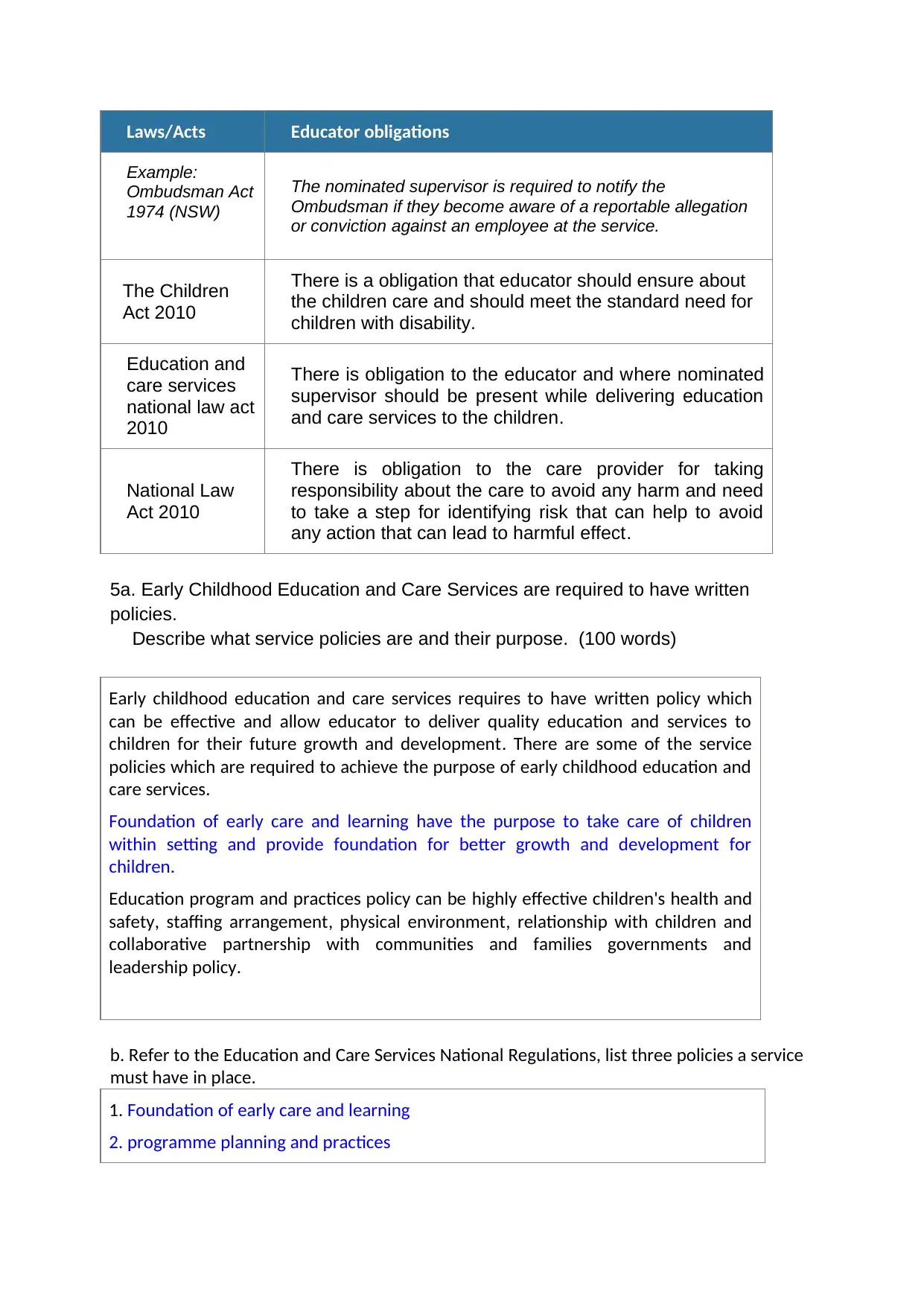
Laws/Acts Educator obligations
Example:
Ombudsman Act
1974 (NSW)
The nominated supervisor is required to notify the
Ombudsman if they become aware of a reportable allegation
or conviction against an employee at the service.
The Children
Act 2010
There is a obligation that educator should ensure about
the children care and should meet the standard need for
children with disability.
Education and
care services
national law act
2010
There is obligation to the educator and where nominated
supervisor should be present while delivering education
and care services to the children.
National Law
Act 2010
There is obligation to the care provider for taking
responsibility about the care to avoid any harm and need
to take a step for identifying risk that can help to avoid
any action that can lead to harmful effect.
5a. Early Childhood Education and Care Services are required to have written
policies.
Describe what service policies are and their purpose. (100 words)
Early childhood education and care services requires to have written policy which
can be effective and allow educator to deliver quality education and services to
children for their future growth and development. There are some of the service
policies which are required to achieve the purpose of early childhood education and
care services.
Foundation of early care and learning have the purpose to take care of children
within setting and provide foundation for better growth and development for
children.
Education program and practices policy can be highly effective children's health and
safety, staffing arrangement, physical environment, relationship with children and
collaborative partnership with communities and families governments and
leadership policy.
b. Refer to the Education and Care Services National Regulations, list three policies a service
must have in place.
1. Foundation of early care and learning
2. programme planning and practices
Example:
Ombudsman Act
1974 (NSW)
The nominated supervisor is required to notify the
Ombudsman if they become aware of a reportable allegation
or conviction against an employee at the service.
The Children
Act 2010
There is a obligation that educator should ensure about
the children care and should meet the standard need for
children with disability.
Education and
care services
national law act
2010
There is obligation to the educator and where nominated
supervisor should be present while delivering education
and care services to the children.
National Law
Act 2010
There is obligation to the care provider for taking
responsibility about the care to avoid any harm and need
to take a step for identifying risk that can help to avoid
any action that can lead to harmful effect.
5a. Early Childhood Education and Care Services are required to have written
policies.
Describe what service policies are and their purpose. (100 words)
Early childhood education and care services requires to have written policy which
can be effective and allow educator to deliver quality education and services to
children for their future growth and development. There are some of the service
policies which are required to achieve the purpose of early childhood education and
care services.
Foundation of early care and learning have the purpose to take care of children
within setting and provide foundation for better growth and development for
children.
Education program and practices policy can be highly effective children's health and
safety, staffing arrangement, physical environment, relationship with children and
collaborative partnership with communities and families governments and
leadership policy.
b. Refer to the Education and Care Services National Regulations, list three policies a service
must have in place.
1. Foundation of early care and learning
2. programme planning and practices
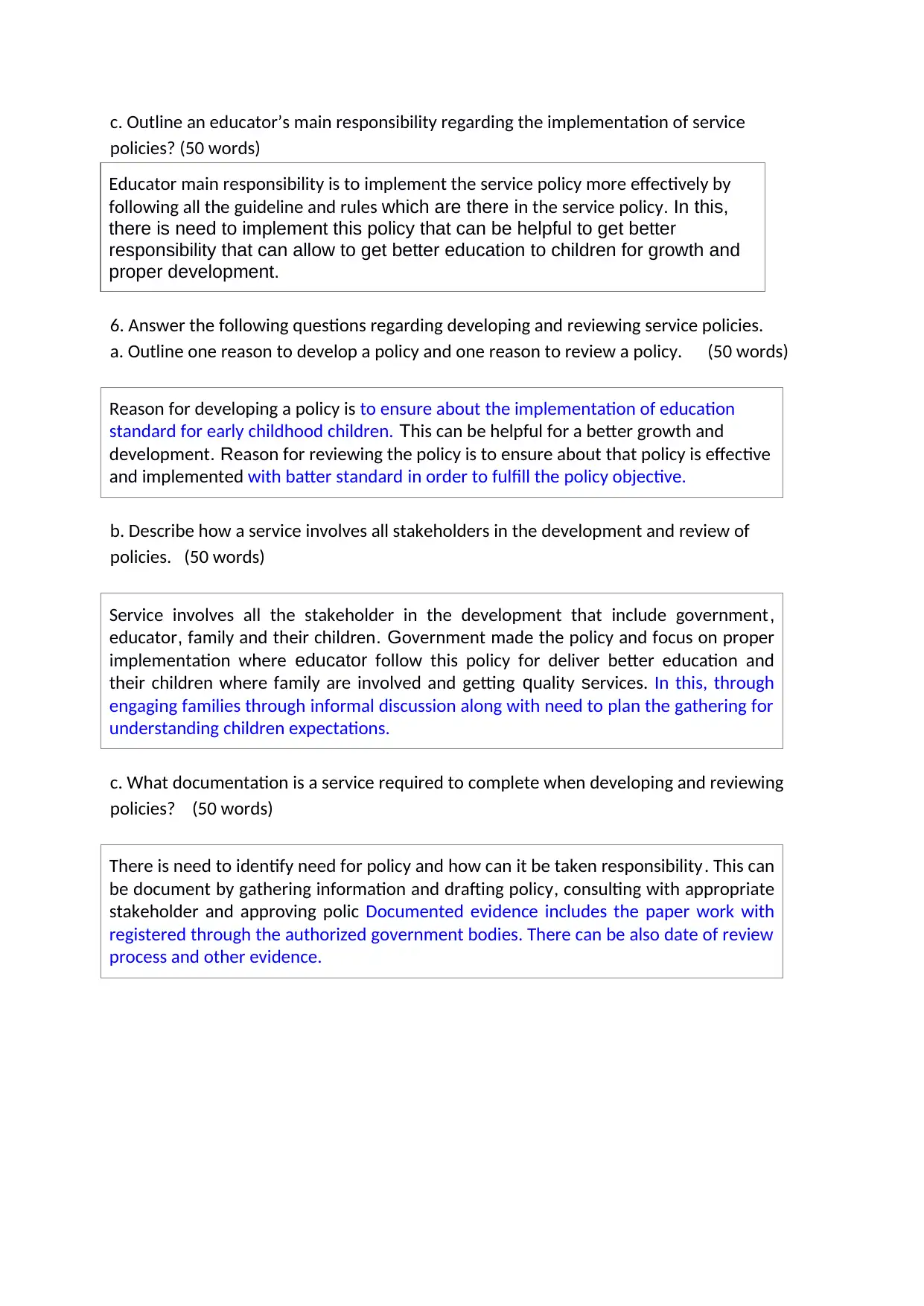
c. Outline an educator’s main responsibility regarding the implementation of service
policies? (50 words)
Educator main responsibility is to implement the service policy more effectively by
following all the guideline and rules which are there in the service policy. In this,
there is need to implement this policy that can be helpful to get better
responsibility that can allow to get better education to children for growth and
proper development.
6. Answer the following questions regarding developing and reviewing service policies.
a. Outline one reason to develop a policy and one reason to review a policy. (50 words)
Reason for developing a policy is to ensure about the implementation of education
standard for early childhood children. This can be helpful for a better growth and
development. Reason for reviewing the policy is to ensure about that policy is effective
and implemented with batter standard in order to fulfill the policy objective.
b. Describe how a service involves all stakeholders in the development and review of
policies. (50 words)
Service involves all the stakeholder in the development that include government,
educator, family and their children. Government made the policy and focus on proper
implementation where educator follow this policy for deliver better education and
their children where family are involved and getting quality services. In this, through
engaging families through informal discussion along with need to plan the gathering for
understanding children expectations.
c. What documentation is a service required to complete when developing and reviewing
policies? (50 words)
There is need to identify need for policy and how can it be taken responsibility. This can
be document by gathering information and drafting policy, consulting with appropriate
stakeholder and approving polic Documented evidence includes the paper work with
registered through the authorized government bodies. There can be also date of review
process and other evidence.
policies? (50 words)
Educator main responsibility is to implement the service policy more effectively by
following all the guideline and rules which are there in the service policy. In this,
there is need to implement this policy that can be helpful to get better
responsibility that can allow to get better education to children for growth and
proper development.
6. Answer the following questions regarding developing and reviewing service policies.
a. Outline one reason to develop a policy and one reason to review a policy. (50 words)
Reason for developing a policy is to ensure about the implementation of education
standard for early childhood children. This can be helpful for a better growth and
development. Reason for reviewing the policy is to ensure about that policy is effective
and implemented with batter standard in order to fulfill the policy objective.
b. Describe how a service involves all stakeholders in the development and review of
policies. (50 words)
Service involves all the stakeholder in the development that include government,
educator, family and their children. Government made the policy and focus on proper
implementation where educator follow this policy for deliver better education and
their children where family are involved and getting quality services. In this, through
engaging families through informal discussion along with need to plan the gathering for
understanding children expectations.
c. What documentation is a service required to complete when developing and reviewing
policies? (50 words)
There is need to identify need for policy and how can it be taken responsibility. This can
be document by gathering information and drafting policy, consulting with appropriate
stakeholder and approving polic Documented evidence includes the paper work with
registered through the authorized government bodies. There can be also date of review
process and other evidence.
⊘ This is a preview!⊘
Do you want full access?
Subscribe today to unlock all pages.

Trusted by 1+ million students worldwide
1 out of 27
Related Documents
Your All-in-One AI-Powered Toolkit for Academic Success.
+13062052269
info@desklib.com
Available 24*7 on WhatsApp / Email
![[object Object]](/_next/static/media/star-bottom.7253800d.svg)
Unlock your academic potential
Copyright © 2020–2026 A2Z Services. All Rights Reserved. Developed and managed by ZUCOL.





